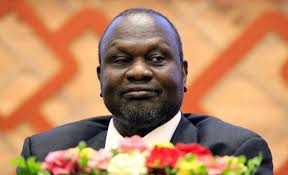The Sudan People’s Liberation Movement-In-Opposition (SPLM-IO) has strongly defended full powers of its leader Riek Machar as other groups seek to reduce them at the ongoing peace talks.
Under the 2015 peace agreement, the first vice president coordinates implementation of the peace agreement and initiates reforms. He also chairs the cabinet meetings in the absence of the president and serves as the acting commander- in-chief of the unified army in the event of any temporary absence of the president.
Manawa Peter Gatkuoth, deputy spokesperson of the SPLM-IO movement, told Radio Tamazuj on Thursday that the full powers of the first vice president were desperately needed to introduce radical reforms in the country. He further said the other opposition groups and the incumbent government were trying to limit the first vice president’s powers.
“The position of the first vice president is completely different from the other four vice presidents who have been included in the revitalized agreement to ensure inclusivity. The position of the first vice president is stipulated in the constitution and the previous agreement, and the first vice president can carry out many responsibilities of the president in case of his absence,” he explained.
“We are confident that the SPLM-IO is the movement that is capable to make reforms in the country. The other opposition groups can supervise some clusters,” he added.
The opposition official warned that the ongoing attempts to weaken Machar’s full powers during the transitional period will not serve the interest of peace in South Sudan.
Separately, Manawa further said they reject any "imposition" of the current 32 states, pointing out that the parties have not yet agreed on the number of the states.
“We reject the 32 states and we are saying that the parties need to go back to the previous agreement on the issue of states or accept 21 states because it will not cause any land dispute between the communities,” Manawa said.
“The issue of states, if not resolved, can cause more conflicts. We are still discussing the issue, so we don’t know whether we will agree on it or not,” he said.
According to the signed deal, an Inclusive Boundary Commission (IBC) will be formed within two weeks of the signed agreement to settle the dispute over the number of states and will complete its work within 90 days.
It also says in the unlikely event of the commission failing to make its final report before the end of its term, it will be automatically transformed into Referendum Commission on number and boundaries of states under the direct supervision of the African Union and the IGAD.
The referendum, according to the signed peace agreement, will be conducted before the end of the pre-transitional period.



